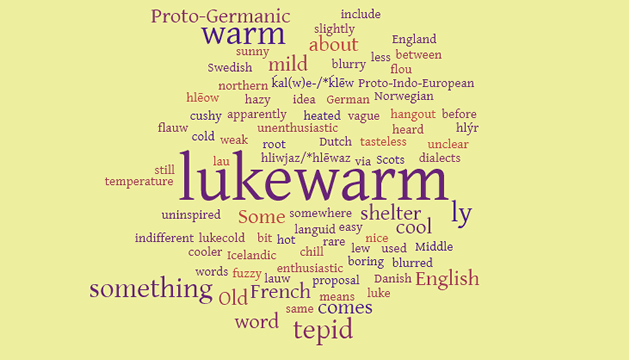
Here’s a recording in a mystery language.
Do you know or can you guess the language, and do you know where it’s spoken?

Here’s a recording in a mystery language.
Do you know or can you guess the language, and do you know where it’s spoken?
A porpoise is a small cetacean of the family Phocoenidae, and is related to dolphins and whales.
The word porpoise comes from the Middle English porpeys/purpeys, from the Anglo-Norman porpeis/purpeis, from the Old French po(u)rpois/pourpais (porpoise), from the Vulgar Latin *porcopiscis (porpoise), from the Latin porcus (pig) and piscis (fish) [source].
Other (archaic / poetic) English words for porpoises, and dolphins, include: sea hogs, sea pigs, seaswine, or mereswine, from the Old English mereswīn (porpoise).
In French a porpoise is a cochon de mer (“sea pig”), or a marsouin [maʁ.swɛ̃], which comes from the Old English mereswīn (porpoise), or from another Germanic language, such as *mariswīn (porpoise, dolphin) in Old Frankish, meerswijn (dolphin, porpoise) in Middle Dutch, or marsvín (dolphin) in Old Norse. These all come from the Proto-Germanic *mariswīną (dolphin, porpoise) from *mari (sea, ocean, lake) and *swīną (swine, pig) [source].
Related words in modern Germanic languages include:
Source: Wiktionary
One of the things that really interests me is finding connections between languages. This is one reason why I enjoy working on Omniglot, and writing and talking about words and etymologies.
Recently I’ve been concentrating on Mayan languages, as you may have noticed. There are now details of all the Mayan languages currently in use on Omniglot, apart from Cauque Mayan, or Kaqchikel-K’iche’ Mixed Language, which is spoken in Santa María Cauqué in the Department of Sacatepéquez in southern Guatemala. If any of you know more about this language, do let me know.
There are also numbers pages, phrases pages, and versions of Tower of Babel story in various Mayan languages. I’ll be adding more numbers pages soon.
When putting together these pages, particularly the numbers and phrases ones, I notice the similarities and differences between them, and I find patterns and connections, which is endlessly facsinating to me.
In a Celtiadur post I wrote yesterday, I discovered connections between words for thunder, tornado and Thursday in Celtic and other European languages.
When learning languages that are related to each other, such as Danish and Swedish, and/or related to languages I already know, I also find connections. Sometimes I have to dig deep into the origins of words to find those links, and this helps me remember them.
Are you learning, or have you learnt, several similar languages at the same time? Do you get them muddled at all? If not, how do you avoid confusion?

Here’s a recording in a mystery language.
Do you know or can you guess the language, and do you know where it’s spoken?
When is a chair not a chair?
The Japanese kanji 椅子 (isu) means chair or stool, and also post, office or position. The word チェア (chea) is used for chair in words like オフィスチェア (ofisuchea), which means office/desk/computer chair.
There are other words pronounced isu or something similar which mean different things:
In Mandarin Chinese a chair is 椅子 (yǐzi). The character 椅 (yǐ) on its own also means chair.
There are other words with similar pronunciation which mean different things:
There are some longer words that include some variation on yizi, such as
Sources: Jisho, LINE Chinese-English Dictionary, 汉英大词典 Chinese-English Comprehensive ABC Dictionary
This was inpsired by this post on Instagram:
So this post is sort of right – in Japanese if you mispronounce the word for chair it can mean something different, but not what whoever made this post thinks. I know it’s a joke, but it would be funnier if they had actually checked.
You can find more language-related nonsense like this on The Language Nerds website.

Here’s a recording in a mystery language.
Do you know or can you guess the language, and do you know where it’s spoken?
Humdudgeon is an interesting Scots word I came across the other day on TikTok.
Can you guess what it means?
Here are some possibilities:
It is in fact a fuss or needless complaint, a big stupid person of an evil disposition, or a bungler. In the plural it means a fit of sulks. Here are some examples of how it’s used:
It is a combination of hum (a hoax or imposition, humbug) and dudgeon (feeling of anger or resentment) [source]. It can also refer to an imaginary illness [source].
Hum comes from the Middle English hummen (to hum, buzz, drone, make a murmuring sound to cover embarrassment), which is probably of imitative origin [source].
The origins of dudgeon are uncertain. It possibly comes from the English word dudgen (something worthless, trash, contemptible), or from the Italian word aduggiare (to overshadow) [source].
If you’re in high dudgeon you’re indignant and enraged or if you leave in high dudgeon you do so resentfully or furiously. Can you also be in low dudgeon (generally happy and content) or even in in mid dudgeon (more or less happy but somewhat angry as well)?
To me, High Dudgeon sounds like a quiant little village somewhere in the southwest of England where the residents are relentlessly indignant and enraged about everything. While in nearby Low Dudgeon people are much more chilled.

A photo of Lower Slaughter, a real village in the Cotswolds in the southwest of England, not far from Upper Slaughter. The slaughter part of their names comes from the Old English word slothre (a muddy or miry place) [source], which probably comes from slóh (a slough, hollow place filed with mire, a pathless, miry place) [source]

Here’s a recording in a mystery language.
Do you know or can you guess the language, and do you know where it’s spoken?
When you see a caterpillar, does it make you think of a cat or a dog?
Why do I ask? Well, the word caterpillar comes from the Late Latin words catta (cat) and pilōsa, a form of pilōsus (hairy, shaggy), via the Old Northern French word catepeluse (caterpillar). So a caterpillar is a “hairy cat” [source].
In French the word for caterpillar is chenille [ʃə.nij], which comes from the Latin canīcula (little dog) because apparently the head of a caterpillar looks like a dog [source].
In Welsh a caterpillar is a deilbryf (“insect/lava/maggot of leaves”), ymlusgyn (“little creeper”), teiliwr (blewog) (“(hairy) tailor”) or teiliwr cantroed (“tailor with hundred feet”) [source].
In Irish a caterpillar is a cruimh chabáiste (“cabbage maggot”) or a péist cháil (“cabbage/kale beast”) [source].
Are there interesting words for caterpillars in other languages?
If something is lukewarm [ˌluːkˈwɔːm / ˌlukˈwɔɹm], it is somewhere between warm and cool. Or you might be lukewarm (unenthusiastic) about an idea or proposal.

Something that is a bit cooler than lukewarm, or something that you’re less enthusiastic about is lukecold, a rare word that I hadn’t heard before.
The word luke comes from the Middle English lew (tepid), which is apparently still used in some dialects in northern England, and also in Scots, where it means lukewarm, tepid or slightly heated. That comes from the Old English hlēow (warm, sunny), from the Proto-Germanic *hliwjaz/*hlēwaz (lukewarm), from the Proto-Indo-European *ḱal(w)e-/*ḱlēw- (warm, hot).
Some words from the same Proto-Germanic root include:
Sources: Wiktionary, Dictionaries of the Scots Language /
Dictionars o the Scots Leid